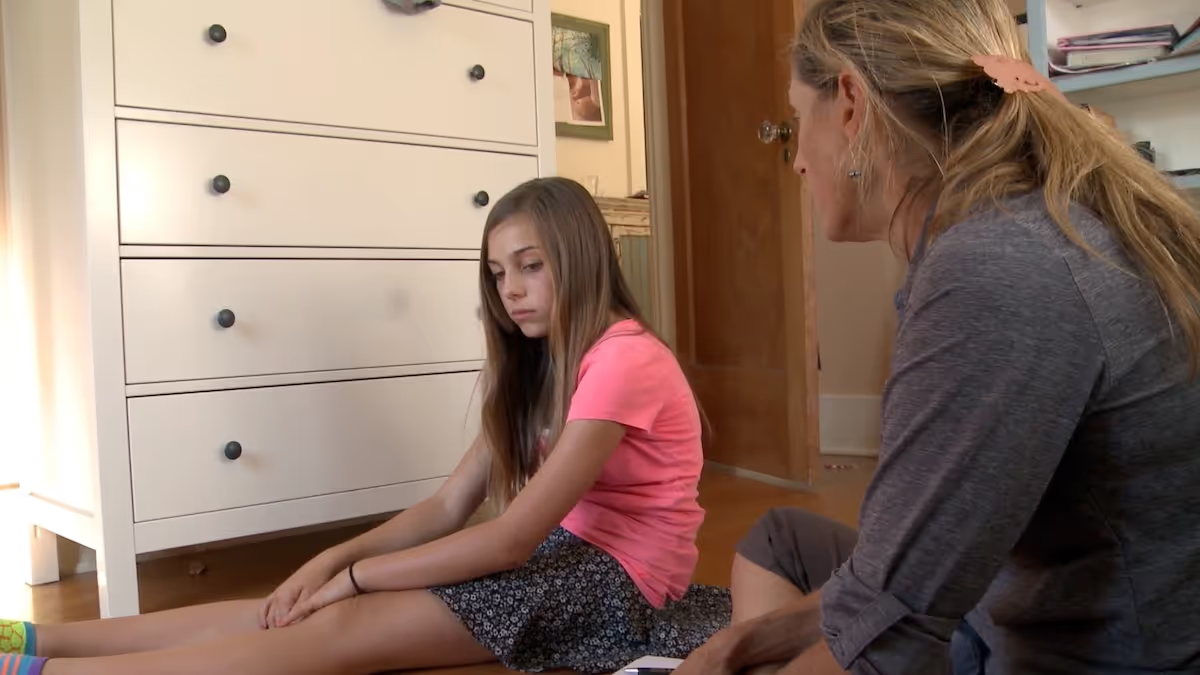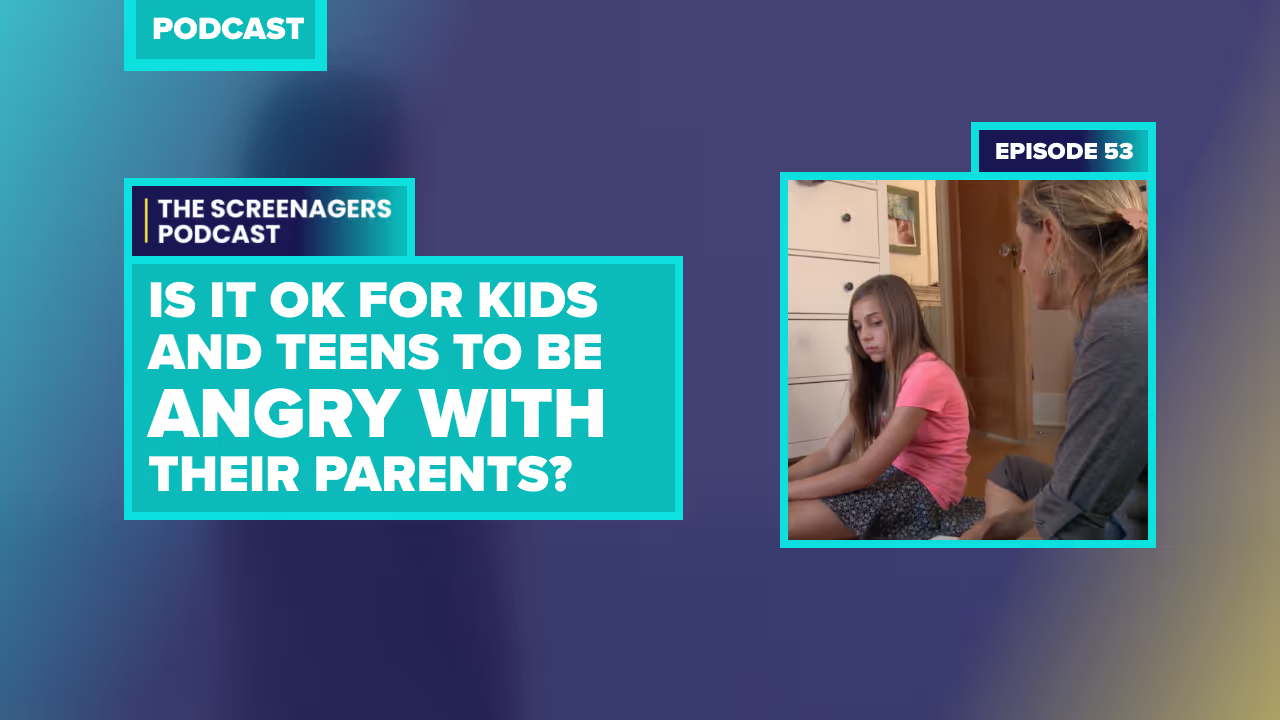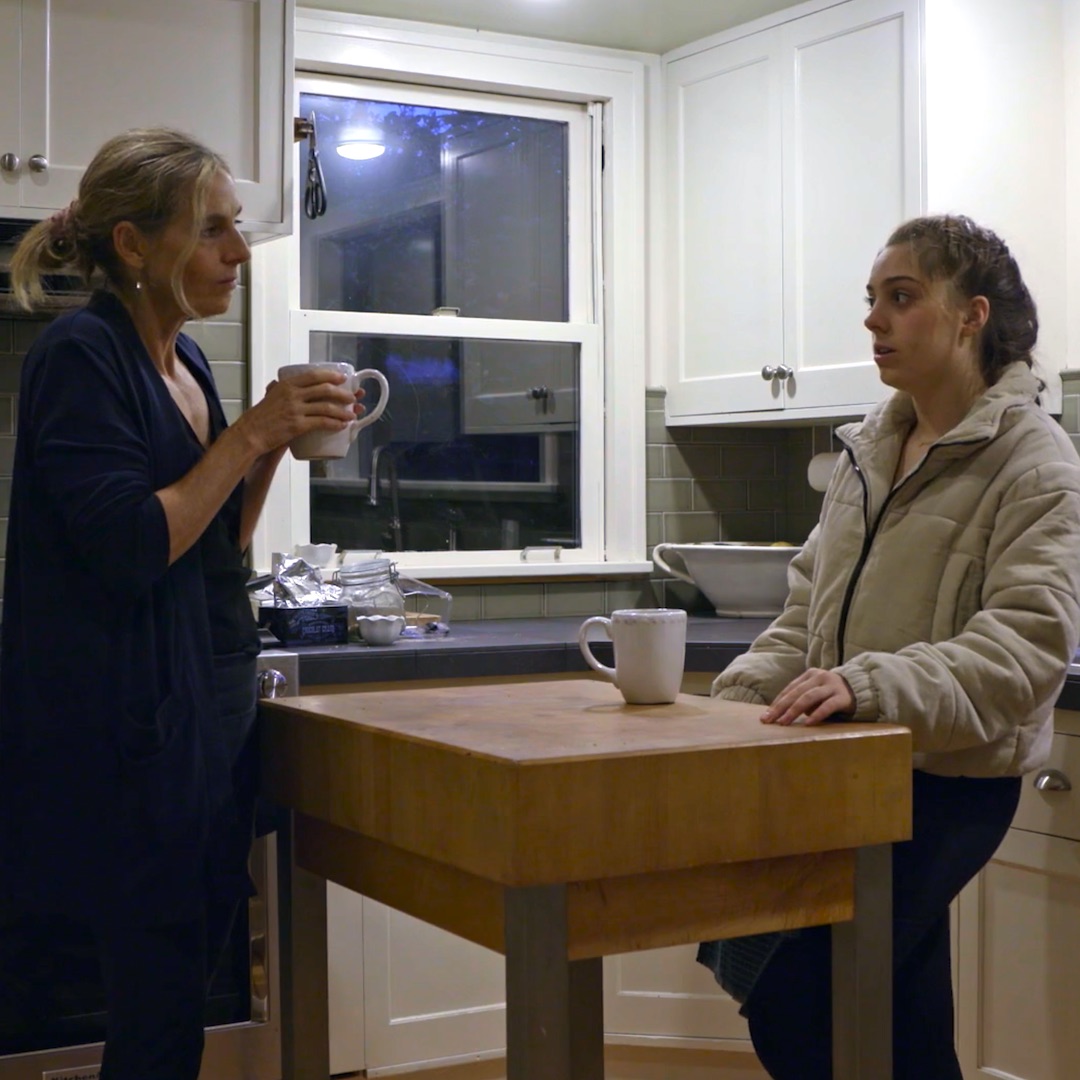


All parents of kids or teens have been there: We realize we need to set a new boundary or limit, often from a desire to ensure healthier media time for our kids, and the result is one very angry child. Sometimes, that anger dissipates quickly, but other times, it can seem like their anger towards us lasts a long time–which can be so challenging for parents to sit with.
I’ve had my share of such experiences parenting my kids. One that particularly stands out to me is when my son, Chase, was in 8th grade. He had gone to a sleepover with a few other boys and, a few weeks later, told me that during the sleepover, they had watched American Pie, an R-rated comedy.
This didn’t sit well with me as I wasn’t ready for him to watch movies like that, so I did what I thought was the responsible thing. I called the parents who hosted the sleepover and had what I felt was a tactful conversation about how we could better communicate what our kids could watch. I also asked that the conversation remain between us.
You know where this is going. Chase found out I had made that call in the worst way… by getting teased by his friends.
He was so angry at me, not just for being teased but that I was placing restrictions on what he could watch that were more limited than his friends. And, in truth, I felt awful. I felt I had done the right thing in talking with the other parents, but knowing how upset Chase was made me question whether I would do it again if I could rewind time.
That feeling only deepened as time went on, and Chase stayed upset. In fact, he even brought it up to me when he was in college.
I remember that clearly because, at the time, I was working on our film Screenagers Under the Influence and interviewing Karen Pavlidis, Ph.D., a longtime therapist for kids and families. While we were setting up for the interview, I told her this story about Chase and how hard it was that he was still upset.
“Ok,” she shrugged, “So he’s mad at you. He might always be mad at you. So what?”
That shrug and “so what” was such an enlightening moment for me. Karen was saying it was okay for him to be mad. I had done the right thing in overseeing his media exposure, even though, sure, he might stay mad about that for quite some time.
Learn more about showing our movies in your school or community!
Join Screenagers filmmaker Delaney Ruston MD for our latest Podcast

Learn more about our Screen-Free Sleep campaign at the website!
Our movie made for parents and educators of younger kids
Learn more about showing our movies in your school or community!
For this week’s podcast episode, I sat down with Karen to explore this topic more deeply.
I wanted to know how we can best manage our own emotions when our children are mad at us, and all we want to do is “fix it”? How can we reconnect with our upset child in a healthy way? How do we know when we’re letting our kids stay in charge because we’re afraid of their emotional reaction?
We had an illuminating conversation, and here I want to share 3 of the many points she raised:
When our kids are angry at us, it can feel like the end of the world. Karen reminds us to keep the larger perspective: remember that you have years and years of building a strong relationship with your child, which will sustain you both through the rough patches.
While it sounds obvious, just those words, when a teen is really upset with my parenting action, have really soothed me as well as other parents I share this with. Karen uses the metaphor of a palm tree in a hurricane to help illustrate this point:
“Two of the main reasons why palm trees withstand hurricanes are because they're flexible and they have this root system that's dense. It works in a way to create a large, heavy anchor, and I just love how this metaphor shows how those years of developing this secure relationship, this secure foundation, means the relationship is not going to crash because of some big emotions.”
Sometimes, when our kids are mad at us, it can feel so uncomfortable that we resort to unhealthy strategies to “fix it.” Parental behaviors such as guilt-tripping, withholding our attention, or using shame to make them feel bad instead of mad can have damaging effects.
When I was a child, I experienced this myself when my grandmother would use guilt and manipulation to make me feel responsible for getting my schizophrenic father to take his medication – a role that shouldn’t belong to a young child.
“Those are toxic parenting behaviors that we want to steer clear from versus those guidelines of being calm, reasonable, and predictable. And that we focus on behavior. And a lot of times when it comes down to it, it's on our behavior and our choices that we're making for our kids, that the kids whose parents are mindfully practicing certain behavior controls tend to do better.”
Know that kids and teens will be disappointed when establishing a new rule or boundary. Rather than be surprised that you’re suddenly in a protracted argument, one strategy Karen advises is for parents to plan an exit strategy in advance.
Have an excuse ready so you can quickly and gently leave the conversation after you’ve set the boundary to give your child time to process the change. One strategy I’ve employed to great success is the “drive-by”: giving your teen the new information as one of you is heading out the door.
”A gentle exit strategy is important to plan. Otherwise, it's very hard not to get pulled into an argument. So, planning ahead of time what the gentle exit strategy is going to be – usually bathroom needs, puppies, doing laundry. Kids need time to metabolize [the new boundary] before we are in this prolonged back and forth. And I think it's going to make those follow-up conversations go better.”
To delve deeper into this topic, listen to the full episode of The Screenagers Podcast.

Listen Here: Apple Podcasts // Spotify // YouTube // Castbox // Website
Learn more about showing our movies in your school or community!
Join Screenagers filmmaker Delaney Ruston MD for our latest Podcast

Learn more about our Screen-Free Sleep campaign at the website!
Our movie made for parents and educators of younger kids
Join Screenagers filmmaker Delaney Ruston MD for our latest Podcast
Be sure to subscribe to our YouTube Channel! We add new videos regularly and you'll find over 100 videos covering parenting advice, guidance, podcasts, movie clips and more. Here's our most recent:
As we’re about to celebrate 10 years of Screenagers, we want to hear what’s been most helpful and what you’d like to see next.
Please click here to share your thoughts with us in our community survey. It only takes 5–10 minutes, and everyone who completes it will be entered to win one of five $50 Amazon vouchers.
All parents of kids or teens have been there: We realize we need to set a new boundary or limit, often from a desire to ensure healthier media time for our kids, and the result is one very angry child. Sometimes, that anger dissipates quickly, but other times, it can seem like their anger towards us lasts a long time–which can be so challenging for parents to sit with.
I’ve had my share of such experiences parenting my kids. One that particularly stands out to me is when my son, Chase, was in 8th grade. He had gone to a sleepover with a few other boys and, a few weeks later, told me that during the sleepover, they had watched American Pie, an R-rated comedy.
This didn’t sit well with me as I wasn’t ready for him to watch movies like that, so I did what I thought was the responsible thing. I called the parents who hosted the sleepover and had what I felt was a tactful conversation about how we could better communicate what our kids could watch. I also asked that the conversation remain between us.
You know where this is going. Chase found out I had made that call in the worst way… by getting teased by his friends.
He was so angry at me, not just for being teased but that I was placing restrictions on what he could watch that were more limited than his friends. And, in truth, I felt awful. I felt I had done the right thing in talking with the other parents, but knowing how upset Chase was made me question whether I would do it again if I could rewind time.
That feeling only deepened as time went on, and Chase stayed upset. In fact, he even brought it up to me when he was in college.
I remember that clearly because, at the time, I was working on our film Screenagers Under the Influence and interviewing Karen Pavlidis, Ph.D., a longtime therapist for kids and families. While we were setting up for the interview, I told her this story about Chase and how hard it was that he was still upset.
“Ok,” she shrugged, “So he’s mad at you. He might always be mad at you. So what?”
That shrug and “so what” was such an enlightening moment for me. Karen was saying it was okay for him to be mad. I had done the right thing in overseeing his media exposure, even though, sure, he might stay mad about that for quite some time.
For this week’s podcast episode, I sat down with Karen to explore this topic more deeply.
I wanted to know how we can best manage our own emotions when our children are mad at us, and all we want to do is “fix it”? How can we reconnect with our upset child in a healthy way? How do we know when we’re letting our kids stay in charge because we’re afraid of their emotional reaction?
We had an illuminating conversation, and here I want to share 3 of the many points she raised:
When our kids are angry at us, it can feel like the end of the world. Karen reminds us to keep the larger perspective: remember that you have years and years of building a strong relationship with your child, which will sustain you both through the rough patches.
While it sounds obvious, just those words, when a teen is really upset with my parenting action, have really soothed me as well as other parents I share this with. Karen uses the metaphor of a palm tree in a hurricane to help illustrate this point:
“Two of the main reasons why palm trees withstand hurricanes are because they're flexible and they have this root system that's dense. It works in a way to create a large, heavy anchor, and I just love how this metaphor shows how those years of developing this secure relationship, this secure foundation, means the relationship is not going to crash because of some big emotions.”
Sometimes, when our kids are mad at us, it can feel so uncomfortable that we resort to unhealthy strategies to “fix it.” Parental behaviors such as guilt-tripping, withholding our attention, or using shame to make them feel bad instead of mad can have damaging effects.
When I was a child, I experienced this myself when my grandmother would use guilt and manipulation to make me feel responsible for getting my schizophrenic father to take his medication – a role that shouldn’t belong to a young child.
“Those are toxic parenting behaviors that we want to steer clear from versus those guidelines of being calm, reasonable, and predictable. And that we focus on behavior. And a lot of times when it comes down to it, it's on our behavior and our choices that we're making for our kids, that the kids whose parents are mindfully practicing certain behavior controls tend to do better.”
Know that kids and teens will be disappointed when establishing a new rule or boundary. Rather than be surprised that you’re suddenly in a protracted argument, one strategy Karen advises is for parents to plan an exit strategy in advance.
Have an excuse ready so you can quickly and gently leave the conversation after you’ve set the boundary to give your child time to process the change. One strategy I’ve employed to great success is the “drive-by”: giving your teen the new information as one of you is heading out the door.
”A gentle exit strategy is important to plan. Otherwise, it's very hard not to get pulled into an argument. So, planning ahead of time what the gentle exit strategy is going to be – usually bathroom needs, puppies, doing laundry. Kids need time to metabolize [the new boundary] before we are in this prolonged back and forth. And I think it's going to make those follow-up conversations go better.”
To delve deeper into this topic, listen to the full episode of The Screenagers Podcast.

Listen Here: Apple Podcasts // Spotify // YouTube // Castbox // Website
Be sure to subscribe to our YouTube Channel! We add new videos regularly and you'll find over 100 videos covering parenting advice, guidance, podcasts, movie clips and more. Here's our most recent:
Sign up here to receive the weekly Tech Talk Tuesdays newsletter from Screenagers filmmaker Delaney Ruston MD.
We respect your privacy.
All parents of kids or teens have been there: We realize we need to set a new boundary or limit, often from a desire to ensure healthier media time for our kids, and the result is one very angry child. Sometimes, that anger dissipates quickly, but other times, it can seem like their anger towards us lasts a long time–which can be so challenging for parents to sit with.
I’ve had my share of such experiences parenting my kids. One that particularly stands out to me is when my son, Chase, was in 8th grade. He had gone to a sleepover with a few other boys and, a few weeks later, told me that during the sleepover, they had watched American Pie, an R-rated comedy.
This didn’t sit well with me as I wasn’t ready for him to watch movies like that, so I did what I thought was the responsible thing. I called the parents who hosted the sleepover and had what I felt was a tactful conversation about how we could better communicate what our kids could watch. I also asked that the conversation remain between us.
You know where this is going. Chase found out I had made that call in the worst way… by getting teased by his friends.
He was so angry at me, not just for being teased but that I was placing restrictions on what he could watch that were more limited than his friends. And, in truth, I felt awful. I felt I had done the right thing in talking with the other parents, but knowing how upset Chase was made me question whether I would do it again if I could rewind time.
That feeling only deepened as time went on, and Chase stayed upset. In fact, he even brought it up to me when he was in college.
I remember that clearly because, at the time, I was working on our film Screenagers Under the Influence and interviewing Karen Pavlidis, Ph.D., a longtime therapist for kids and families. While we were setting up for the interview, I told her this story about Chase and how hard it was that he was still upset.
“Ok,” she shrugged, “So he’s mad at you. He might always be mad at you. So what?”
That shrug and “so what” was such an enlightening moment for me. Karen was saying it was okay for him to be mad. I had done the right thing in overseeing his media exposure, even though, sure, he might stay mad about that for quite some time.

When teens say they hate you, it often feels personal, but it may not truly be about you. Teens sometimes direct their overwhelming feelings toward the safest person in their life. Instead of responding with logic or backing down out of fear, check that your limits are fair, practice self-compassion, and focus on validation rather than correction. If conflict feels stuck, family counseling can help both sides feel heard and understood.
READ MORE >
Thoughtful family tech rules help protect kids’ wellbeing, learning, and sleep while strengthening connection at home. Using the fresh start of a new year, this post shares eight practical tech habits families can discuss and adapt together, including shared social media check-ins, screen time inventories, device-free meals, regular gaming breaks, and keeping phones out of bedrooms at night.
READ MORE >
Psychologist Jean Twenge explains how parental controls can support healthier tech use by protecting sleep, limiting late night device access, and reducing kids’ exposure to content they are not developmentally ready to handle. She discusses why third party parental control tools are often more effective and easier to use than built in options, while acknowledging that no system is perfect. Clear boundaries, combined with technology based limits, can reduce ongoing conflict and make screen time rules easier to enforce.
READ MORE >for more like this, DR. DELANEY RUSTON'S NEW BOOK, PARENTING IN THE SCREEN AGE, IS THE DEFINITIVE GUIDE FOR TODAY’S PARENTS. WITH INSIGHTS ON SCREEN TIME FROM RESEARCHERS, INPUT FROM KIDS & TEENS, THIS BOOK IS PACKED WITH SOLUTIONS FOR HOW TO START AND SUSTAIN PRODUCTIVE FAMILY TALKS ABOUT TECHNOLOGY AND IT’S IMPACT ON OUR MENTAL WELLBEING.
